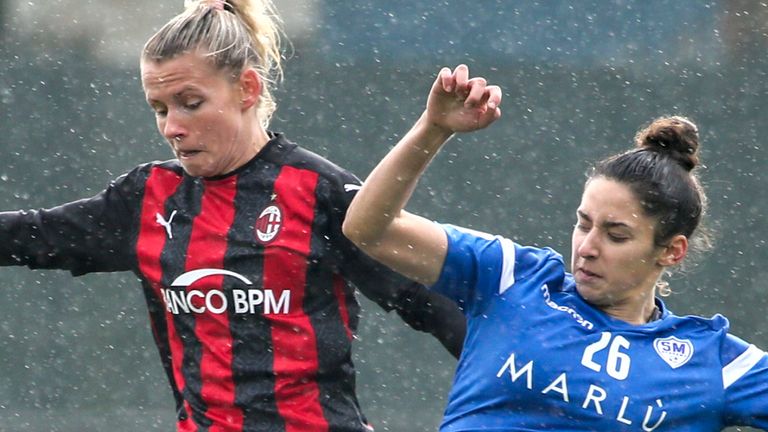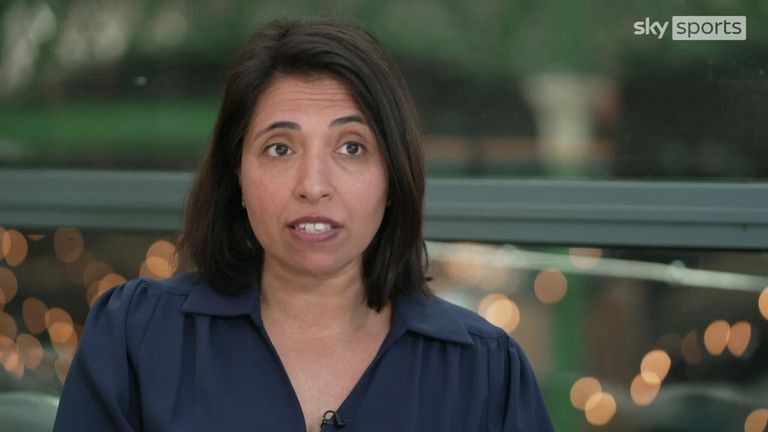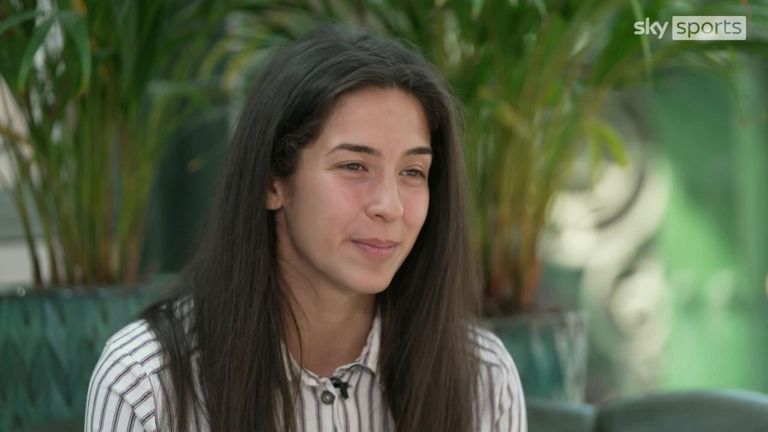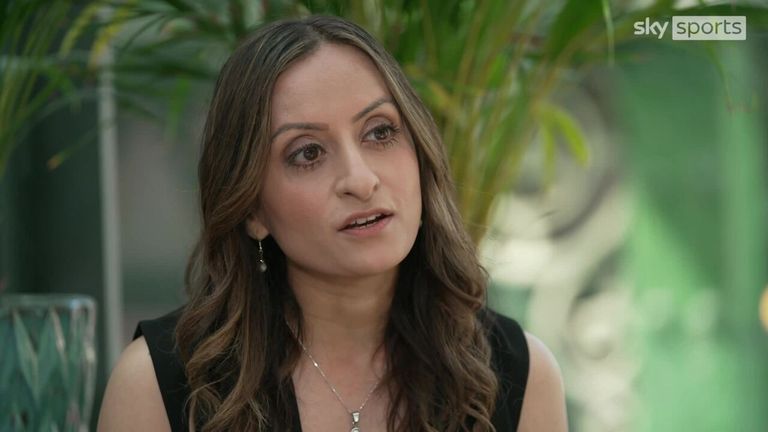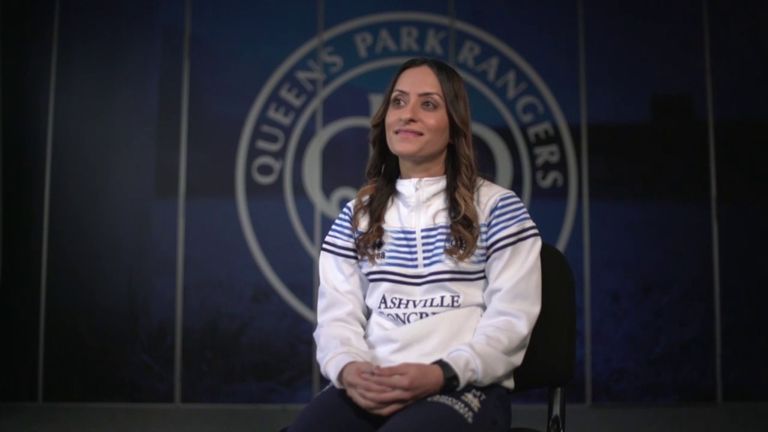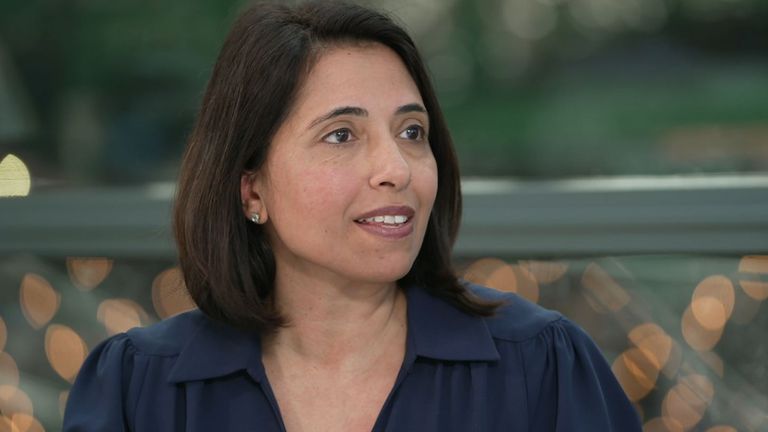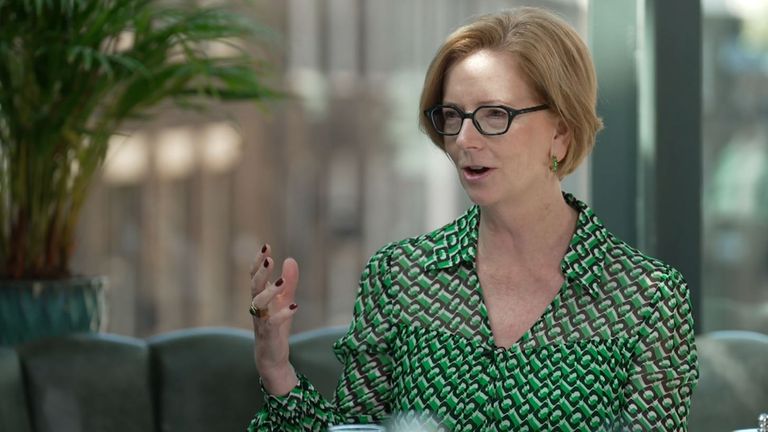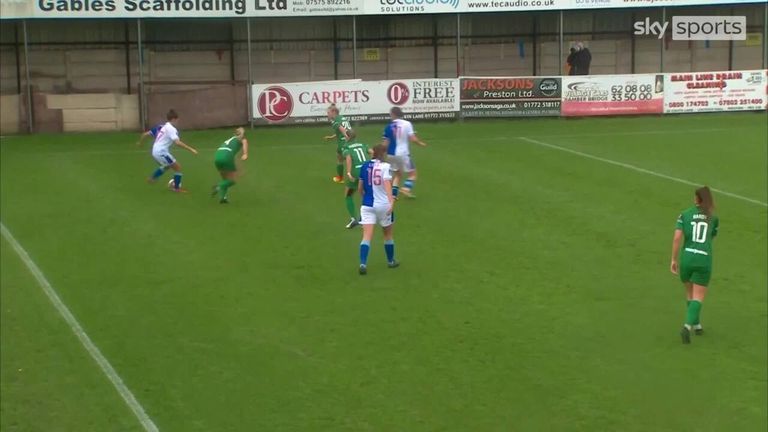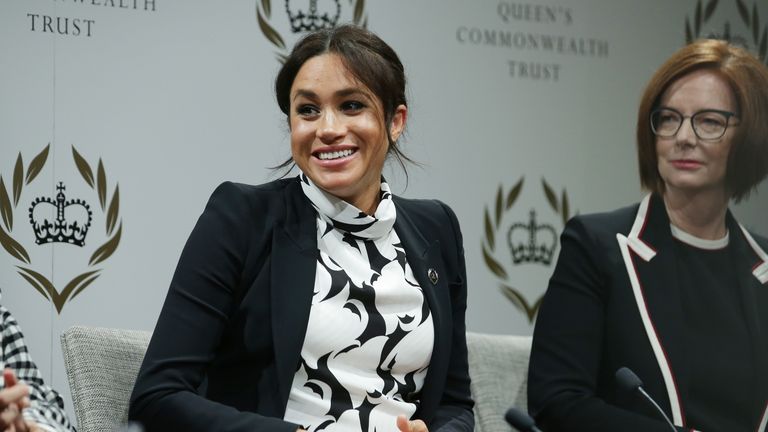South Asian Heritage Month: Rupinder Bains, Manisha Tailor and Millie Chandarana discuss leadership with Julia Gillard
South Asian Heritage Month: Australia’s only female PM Julia Gillard chairs women and leadership debate with FA’s Rupinder Bains, QPR’s Manisha Tailor & Blackburn's Millie Chandarana; topics include discrimination, imposter syndrome and working mothers in leadership
Monday 18 July 2022 12:05, UK
Three female trailblazers from the South Asian community have spoken in a discussion about women and leadership with Australia’s first female Prime Minister Julia Gillard.
A women's professional footballer, QPR's assistant head of coaching and a member of the FA Board member shared and learned from each other.
Rupinder Bains is the first Asian to be appointed on the FA Board, Manisha Tailor is QPR's assistant head of coaching and the only person from a South Asian heritage to reach that level. Millie Chandarana is a midfielder for Blackburn Rovers Ladies.
Sky Sports News invited the guests to join Gillard at a restaurant in central London as they discussed their lived experiences of leadership and working in football to mark the start of South Asian Heritage Month.
As chair of the prestigious Global Institute for Women's Leadership, Gillard told them of her experiences as Prime Minister. "A lot of people looked at me through the prism of gender and they had expectations about how a woman should behave," said the woman who became Australia's first female PM in June 2010.
"And if you stepped outside them, if you came on too strong, people would go 'oh, I don't like that'. If you came across as too nice, people would say 'has she really got the backbone it takes to lead?'"
Stereotypes of women in football
On the topic of stereotypes, Chandarana talked about her experiences. "For me personally, I think that I lead because I am surrounded by a group of strong women anyway in a women's team," she said.
"But funnily enough, as soon as I go elsewhere from someone who doesn't know much about women's football, there are the struggles there because they don't really understand women's football. They don't understand women can play football. So, we struggle still in that way when we go outside women's football. That's what I've found."
Gillard asked Tailor whether the stereotypical view of a white male coach shouting from the sidelines has led to some people questioning whether she can coach.
Tailor said: "When I was appointed into the role that I am in now, which is more of a strategic role where you are now responsible for 120 young people, just over 20 members of staff and male members of staff. That certainly is very different to me, managing women and certainly the leadership styles that I was able to adopt and use."
As QPR's assistant head of coaching, Tailor's role also includes strategic overview and she is responsible for the U9 up to the U16 age groups at the Championship club.
She added: "I soon realised that actually I'm going to have to be a lot more adaptable. And the stereotypes that we know that certainly exist around women in leadership positions within football were around the fact that, like you alluded to, I hadn't played the game as a professional.
"Those opportunities didn't exist for me. I was coming from a completely different sector and environment and then transitioning into the world of professional football."
"I think having strong leaders around you like Millie said, and strong people around you is very important in order to help you become a better leader. And that's certainly helping me in the position that I'm in."
'Fairly natural to feel imposter syndrome'
Rupinder Bains was appointed to the FA board in November 2017 after a unanimous recommendation. She also founded her own law firm Pinder Reaux and Associates 17 years ago.
She admitted having imposter syndrome before joining the FA despite a successful career.
Bains said: "Before I came to join the FA, I was a lawyer. I still am a lawyer and I'm the managing director of my law firm. So I'm in a leadership position anyway. But that being said, coming over to the Football Association, I felt imposter syndrome straight away. Do I belong here? What am I going to add to this huge organisation? But I was very fortunate because the make-up of the FA boardroom now is very different to what I understand and what I hear it to have been before."
"I was the first-ever South Asian person to be on the board of the English Football Association. So, for me, that carried an additional burden. I wasn't just a woman, but I was an Asian woman."
Bains juggles the workload with her full-time work as a managing director of her law firm which specialises in litigation, sports law, and media work. She is heading into her fifth season on the FA Board and is also on the Women's Football Board.
The 47-year-old added: "The boardroom is just a wonderful dynamic. Everyone around that table - yes we have differences of opinion, but we debate in a healthy and progressive way. And so that imposter syndrome did die down. And I think it's fairly natural to feel that."
The value of mentorship
Gillard said that she found mentorship very important. She told the panel: "I was the first woman to serve as Australia's Prime Minister, but there had been a woman who'd served as premier of the state of Victoria. She was the first. She was a great mentor for me. But what's your experience of that been?"
Chandarana talked about the benefit of mentorship she is experiencing. The 25-year-old said: "For me, mentorship has been massive, especially in the last few months. I'm working with a mentor currently for myself to develop, and that's pushed me to become a mentor myself for South Asian girls, whether that be in sport, whether that be in football, sport in general. So it's something really big for me because it's helped me progress. And then now I want to help others."
In 2017 Tailor received an MBE for services to football and diversity in sport. This year she has written about her experiences and interviewed others for a book. Dream Like Me - South Asian Football Trailblazers is released in September and profiles more than 40 individuals who are pioneers in football.
Gillard describes being the first to achieve something as a "burden in some ways" and asked Tailor how she felt as a trailblazer in her high-profile roles off the pitch.
Tailor said: "I think being the first, like yourself Julia, like Rupinder, is very challenging because you would want somebody to look up to. To be able to learn from, learn from their journey. Learn from some of their experiences. And what I found was for me, being the first in the role that I'm in across the football league, in the EFL as a woman but also as a South Asian female has been very challenging."
"More recently me attaining the A licence as a South Asian woman, being one of the first where you're having to have this burden of battling through. Of having to forge a path not only for yourself, but also for those behind you, because you want to be in a position where you can leave a legacy."
"Therefore, I think having cultural diversity at the top is crucial. And I'm fortunate to be in an environment where that is the case, where I walk into a club (QPR) where the owners, the board, the technical director, the director of football. There is diversity among that. But also having a cultural empathy through a white academy director equally is also important as well."
'You know you're going to be the only one…'
Gillard also asked the panel about resilience and asked: "Is there a time when someone said something to you that was sexist, racist, both that was excluding and potentially meant to be excluding, or it might have been through ignorance. But the effect was to kind of say, your place isn't here. Can you recall any of those moments?"
Tailor, who has completed a master's in leadership and also worked as a headteacher, recounted some of her experiences after changing career and moving into football.
"For me, the most challenging thing has been around the unsaid, because things are never as open with regards to how people feel about you," she said.
"And although the landscape is changing, what we recognise is that the lens is still very closed with regards to women and women from a South Asian community, and particularly those now into football.
"And therefore, when you walk into a room, you know already that you are going to be the only one because you are the only one that looks like you.
"I remember the first time that I was asked to go to a league conference, and I was so nervous that I sat in the car for about 20 minutes and I called Chris Ramsey (now QPR head of coaching who is Tailor's superior) and I said, 'I don't even know how I'm going to be, you know, whether I'm going to be accepted. Who am I going to talk to? I don't really know anyone there'.
"And he said to me, 'You need to come out of your car. You are a strong person and you just need to have a little bit more belief in yourself.'
"And there's always been moments like that because I already know that actually it's unfamiliar territory and that comes with also accepting I feel vulnerability and the fact that it's okay to be vulnerable and it's okay to sometimes feel nerves, feel anxious because the moment you step over that hurdle, you do it again. And actually, that's how you build confidence and then you grow."
Chandarana believes there is still an ongoing battle for equality and for women to become leaders, and added: "We've always had to fight for what we want. We've always had to fight to be professional and to have that professional status, to say, I am a professional female footballer. That's only been something I can do within the past year. It's only been accepted within the past year.
"I've been playing football for 20 years. Now I'm a professional footballer but we still are fighting. There's a lot of women that are still not full-time footballers. We have to do other jobs. I have to do other jobs. I'm a dual-career athlete, so hopefully in the next five years we will have that status as professional female footballer for everyone, for all of us."
English-Gujarati midfielder Chandarana has played for Manchester United through their youth academy before playing for Loughborough Foxes. She also had a spell in Dubai.
More recently she spent two seasons in Italy's top division, Serie A Feminine, playing for UPC Tavagnacco in 2019 before joining San Marino Academy the following year.
Chandarana returned to FA Women's Championship side Blackburn last year and last week signed her first professional contract with the club.
'Sexism and racism can be more subtle … the nuances are there'
Gillard spoke about the experiences of a friend in the UK. She said: "A friend of mine here in the UK is a woman from a South Asian background, a South Asian woman, and she's very senior in the civil service.
"She goes to a lot of meetings where people are being brought together but they don't really know each other. And she says time after time, it's assumed that she's the catering person or the coat-check person. She says she routinely says to people when they ask her where the coffee is or could you tell me where to put my coat or whatever?
"She says to them, 'Look, I know you've done some stereotyping here. I just want to point out I'm here because...' and she announces her position which is a very senior one. 'What I'd really like to do now is just have a do-over moment where we're pretending we're meeting for the first time. So let's just leave that in the past.' They will have learned from the exchange.
"Are there things like that, which happen, other moments where you just think, 'wow, it's really all still out there', this cocktail of sexism and racism?"
Bains said she believed sexist or racist moments are "not so prevalent now". She added: "[There were] many incidences when I was first entering the legal profession but now in football, I think it's a lot more subtle if it does exist. It's subtle and from what I hear from other female colleagues in that it kind of takes the form of banter and the misogyny if that's not too strong a word. It's there in a subtle way.
"Because equality, diversity, inclusion, these headline topics are more prevalent and they're being discussed a lot now in every sector of business of sport. So everyone's alive to these issues.
"I don't think anyone is so overt anymore. But there is that subtle, the nuances are there. The undertones are there but they get brushed aside as just being banter and it's not very serious. But people are still offended by these comments and they shouldn't be made in any way, shape or form. Fortunately, I haven't heard it or felt it. But I know it exists."
Having mum's guilt as a leader
Gillard told the panel about some hurdles women face in leadership. She said: "Women have periods. Women have kids. I don't have children. But if I look at my political world, there are lots of male Prime Ministers who have had a child when they were in office Boris Johnson, David Cameron, Tony Blair here in the UK.
"When Jacinda Ardern had her baby as the Prime Minister of New Zealand, obviously the world went mad … 'how is this going to work?' She's got a big job. She's having a baby. Women, athletes, professional footballers, they're going to have kids. How's the game going to deal with that?"
Bains, who was the only member of panel with children, spoke about "mum's guilt" which she thinks is a common hurdle.
"For me, I've got a 21-year-old and a 17-year-old now, but I've worked pretty much throughout their lives," she said. "I worked up until the day I had them, and went back very shortly afterwards.
"You have mum's guilt, and I think anyone in any leadership position has that time when you feel I should be at home, I should be doing this, and I'm not invested in the children as much as perhaps I should be. I think we need to kind of be less hard on ourselves because it is possible to spin those plates."
"It's possible and it's not easy. It is difficult. But we've all had challenges in our lives in all different ways. So, this is just another aspect to our lives that we deal with. Having role models that can, I think, speak to those experiences with authenticity and without apology, I think is very important."
Julia Gillard's analysis of South Asian women in football
After the debate, Gillard, who admits she does not know too much about women's football in the UK, reflected on what she had heard.
"I think I'd say that there's been a lot of change. Positive change for women, football, women's leadership. But there's still more to do," said the chair of the Global Women's Institute for Women's Leadership at Kings College.
"At the start, I asked about the five-year-old girl who just loves her football. If we were talking to that girl now thinking about her future. What are the other things we need to do to make sure she has an equal and a fair journey in football compared with a five-year-old boy?"
Chandarana said: "I think we just need to keep going with it. We need to keep pushing for that professionalism. We need to keep pushing to have those women in higher positions, to have those role models on and off the pitch as well. If you can see it you can be it.
Tailor gave her view on the progress made so far and said: "For a five-year-old girl now she can actually see women playing football on TV. She can see women visibly as presenters, pundits, coaches, particularly around the women's game. Although that's evolving and we understand we need to also continue to change that within the landscape of the boys game. So that women or girls also feel that if they wish to work with boys they can and it's accepted.
"We're in a much better position now and with that role-modelling and visibility young girls now can not only dream but they can actually believe that those dreams are possible."
From a leadership and boardroom perspective in sport but also equally applicable in other areas, Baines said: "There are still barriers which we need to overcome. So you've got your cultural barriers and those still exist because we are still expected to perform and act in a certain way and that engenders biases.
"Then you've got societal impacts which relate to the fact that we're expected to have children, bring them up and behave in a certain way and take certain career paths.
"And then you've got the workplace. What happens in a lot of organisations is that their recruitment patterns, retention and promotion is always done in a particular way. And that seems to be a bar to women or women who have had children.
"So we need to tackle those bars and a lot of that has got to do with - in the workplace in particular - how you're operating and how you're reviewing what's being done. And that's got to be a constant churn of work.
"At the FA they take that very seriously. As a whole in the organisation right now statistically we have 37 per cent female workforce, with a target of increasing that to 50 per cent in the next few years. And in leadership positions, we're at 39 per cent. So we're doing fairly well but there is room to advance.
"How do organisations do this? They've got to keep reviewing what are the processes we're using. Have a taskforce that's made of male and female and diverse within that as well. To get everybody's opinions and see what's going on. Challenge yourselves as an organisation.
"If women are offered opportunities to progress but they're not taken, perhaps have that opportunity exit interview to find out why wasn't it taken. Because you'll be surprised although you think you've challenged and tackled all the barriers you probably haven't. And you need to ask those questions now.
"So that constant review process of your own organisation will help in creating those opportunities for women to go forward. It is still difficult out there. It's not easy but it's about taking that responsibility now."
Gillard's famous 2012 misogyny speech
Almost 10 years ago in October 2012, Gillard famously attacked the then-leader of the opposition, Tony Abbott, for being a misogynist in a speech which got worldwide media attention.
She said in the House of Representatives: "If he (Abbott) wants to know what misogyny looks like in modern Australia, he doesn't need a motion in the House of Representatives, he needs a mirror. Later in the speech, she added: "Misogyny, sexism, every day from this Leader of the Opposition. Every day in every way, across the time the Leader of the Opposition has sat in that chair and I've sat in this chair, that is all we have heard from him."
Reflecting on that speech, Gillard said: "I think things have changed, I guess I would give the same summary (as South Asian women in football). Things have got better but there's still more to do.
"And on the more to do, more women coming into politics is needed. If you look around the Parliaments of the world, the leaders of the world, we are nowhere near half and we should be.
"But there's also the stereotyping bit, I think how people react to women leaders and there's a lot of psychological study now that we've all got sexist stereotypes whispering in the back of our brains and we're sort of wired to think an assertive woman is probably a nasty woman, those kinds of things.
"But when those stereotypes come into the public domain now, people call them out. And that wasn't happening 10 years ago. And I'm a big believer that unless you call it out, you name it, which is what I did with the misogyny speech, then you won't be on a journey to change it until you do that foundation point.
"And so, I am optimistic that it's getting better in politics too, but certainly more to do."
Play the video at the top of the story to see the full Women and leadership in sport discussion between Julia Gillard, Millie Chandarana, Manisha Tailor and Rupinder Bains.


